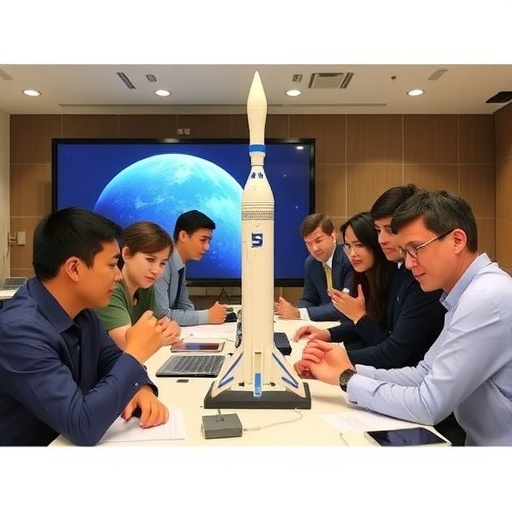The University of Surrey in the United Kingdom and National Central University (NCU) in Taiwan have embarked on a significant partnership aimed at fostering innovation and collaboration in the field of space research. Both institutions have recognized the pressing need to address the growing challenges in the space industry, particularly in the areas of space radiation data and the development of resilient space infrastructure. This memorandum of understanding symbolizes a strong commitment to collective efforts that will not only benefit their respective academic communities but also contribute to the global space sector.
By combining their resources and expertise, the University of Surrey and NCU intend to explore a multitude of collaborative projects. Among the key objectives outlined in their partnership is the exchange of crucial data related to space radiation. This data is vital for understanding and mitigating the effects of radiation on both human and mechanical entities operating in space. As space missions become more complex and ambitious, having reliable data is essential for ensuring the safety and success of those missions.
Moreover, the collaboration aims to focus on the design and creation of future instruments that will measure space radiation more effectively. The development of advanced measuring instruments is crucial as it directly impacts the success of scientific experiments and engineering applications in space. Both universities are well-equipped to tackle these challenges, with their rich histories in space research, engineering, and innovation. Their combined efforts in this domain could pave the way for breakthroughs that enhance our understanding of space weather phenomena.
The hands-on opportunities provided by this collaboration will also extend to students from both universities. With practical experience being a cornerstone of education in engineering and technological disciplines, students will have the chance to participate in live missions and engage with space hardware. This exposure is designed to cultivate a new generation of engineers and scientists who are well-prepared to meet the evolving demands of the space industry. As global demand for skilled professionals in the field continues to rise, initiatives like these are crucial for bridging the skills gap.
Prof. Wing Ip, a prominent figure at NCU and Chair of the Taiwan Space Union, emphasized the importance of this partnership. He noted the exemplary reputation of the University of Surrey in revolutionizing small satellite technology and training skilled space engineers. This partnership signifies a shared ambition to build on existing legacies and push the boundaries of research and innovation in space engineering.
On the other hand, Professor Adam Amara, the Founding Director of the Surrey Space Institute, expressed his enthusiasm for this new collaboration. He elaborated on the shared strategic vision both universities have towards addressing space industry skills shortages in Taiwan and the UK. With a substantial history in satellite manufacturing, both institutions are poised to leverage their common research interests, particularly in areas such as solar radiation.
The collaborative nature of the partnership was demonstrated through previous engagements between the two institutions. Recent collaborative efforts included successful interactions where students from both universities worked together under the guidance of the launch provider Stellar Kinetics. They participated in integrating the Jovian-O and SIGHT space payloads onto the KEA-1 rocket at Etlaq Spaceport, Oman—a noteworthy achievement that showcases effective teamwork while furthering their technical skills.
From a research perspective, the two universities possess complementary fields of interest. The Surrey Space Centre has been pivotal in developing radiation detectors that are crucial for understanding space-based radiation. Through programs like the UK’s SWIMMR initiative, Surrey has been at the forefront of creating miniature detectors designed to measure radiation across varying altitudes. Such innovations play a significant role in enhancing resilience to the challenges presented by space weather and its unpredictable nature.
On the other hand, NCU has made considerable advancements in developing scientific payloads and small satellite missions. Notably, the Deep Space Radiation Probe (DSRP) launched aboard the lunar lander ispace, Inc. in January 2025, is a groundbreaking mission. As Taiwan’s first payload to operate beyond Low Earth Orbit, the DSRP has provided critical data regarding radiation belts and solar storms, demonstrating NCU’s capabilities and contributions to space science.
With the establishment of the Destiny of Space initiative at NCU and the rich legacy of the Surrey Space Centre, it is clear that both institutions are well-prepared to lead in this rapidly advancing field. The creation of new programs and research agendas during this partnership will ensure that they are aligned with the contemporary challenges of the grander space economy.
While pioneering their respective journeys in space exploration, Taiwan’s ambitions to grow its space economy to an impressive 1 trillion NTD by 2029 provides the context for this partnership. The collaboration between NCU and the University of Surrey is poised to address the skill shortages that may arise as this goal is pursued, through career professional development and new educational programs designed to prepare the workforce for future challenges.
To encapsulate, the partnership between the University of Surrey and National Central University not only represents an exciting advance in academic collaboration but also highlights the importance of international cooperation in the field of space research and technology. Such alliances are instrumental for nurturing talent, fostering innovation, and ultimately enriching our understanding of space, thereby contributing to humanity’s exploration of the final frontier.
Subject of Research: Collaboration in Space Research and Technology
Article Title: Partnership Between University of Surrey and National Central University to Revolutionize Space Research
News Publication Date: October 2023
Web References: N/A
References: N/A
Image Credits: University of Surrey
Keywords
Space Research, University of Surrey, National Central University, Collaboration, Space Radiation, Engineering, Satellite Technology, Education, Global Skills Shortage, Space Industry, Innovative Research.




